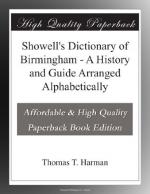Hon. G. M. Yorke.—Brother to the late Earl of Hardwicke, and born in 1809, Mr. Yorke, on finishing his University education, entered the army, obtaining a commission in the Fourth Dragoons; and, considering his subsequent connection with Birmingham in a widely different character, it is curious that his first visit here should have been paid as an officer of dragoons in the Chartist riots of 1839. Mr. Yorke’s personal tastes, however, led him to prefer the Church to the army, and he entered into holy orders, the Bishop of Worcester, in 1814, presenting him to the rectory of St. Philip’s: and at a later period he was nominated Rural Dean. Mr. Yorke held the living of St. Philip’s for the long period of thirty years—until 1874—when the Prime Minister appointed him Dean of Worcester. During his residence in Birmingham Mr. Yorke did much public service in connection with various educational institutions. He promoted good schools in St. Philip’s parish, and was an active member of the committee of the Educational Prize Scheme, and then of the Education Aid Society, both of them institutions which were of great value in their day. He also took a strong interest in the affairs of Queen’s College, of which he was for many years the Vice-president. In the Diocesan Training College, at Saldey, he likewise took part as a member of the managing body and he was interested in the School of Art and the Midland Institute. Wherever, indeed, there was educational work to be done, the Rector of St. Philip’s was sure to be found helping in it; and though there have been many Rectors at the church it can be truly said that none left more regretted by the poor, notwithstanding the aristocratic handle to his name, than did Mr. Yorke. The Hon. and Rev. gentleman died at Worcester, Oct. 2, 1879.
J.C. Miller.—The Rev. John Cale Miller (born at Margate, in 1814), though only thirty-two, hail already attracted the notice of the Evangelical Party in the Church, and his appointment to St. Martin’s (Sept. 1846), gave general satisfaction. His reputation as a preacher had preceded him, and he soon diffused a knowledge of his vigour as a worker, and his capacity as an administrator. Few men have entered so quickly into popular favour as Dr. Miller did, which may, perhaps, be accounted for by the fact that he not only showed a sincere desire to live in harmony with the Dissenters of all shades, but that he was prepared to take his full share in the public work of the town, and determined to be the minister—not of any section of the people, but of the parish altogether. Under his direction St. Martin’s became a model parish. New facilities were afforded for public worship, schools were established, parochial institutions multiplied under his hand, an ample staff of curates and scripture-readers took their share of labour, and the energies of the lay members of the congregation were called into active exercise. To the Grammar School, the Midland Institute,




